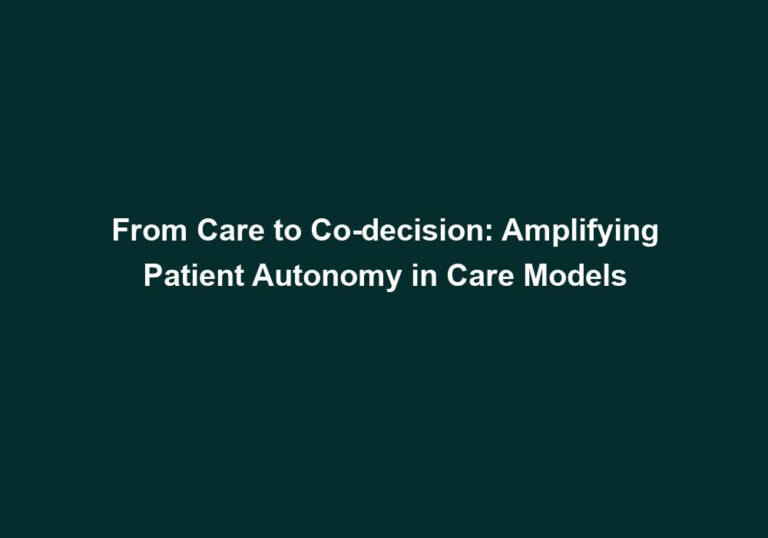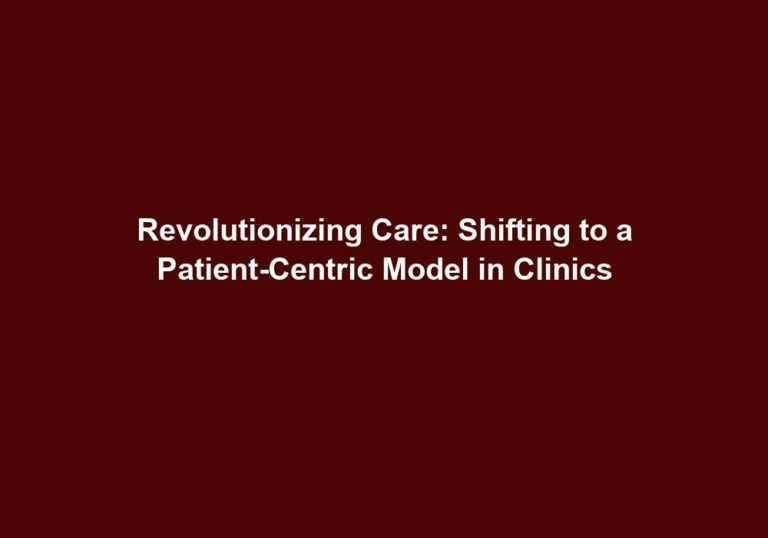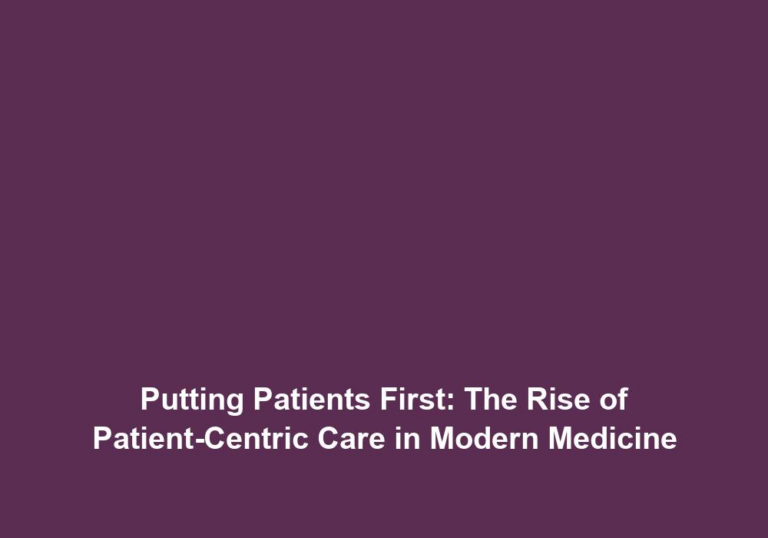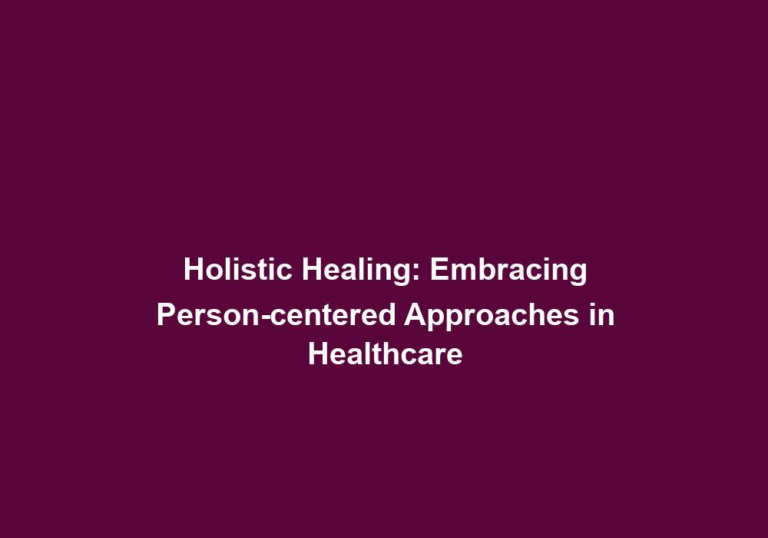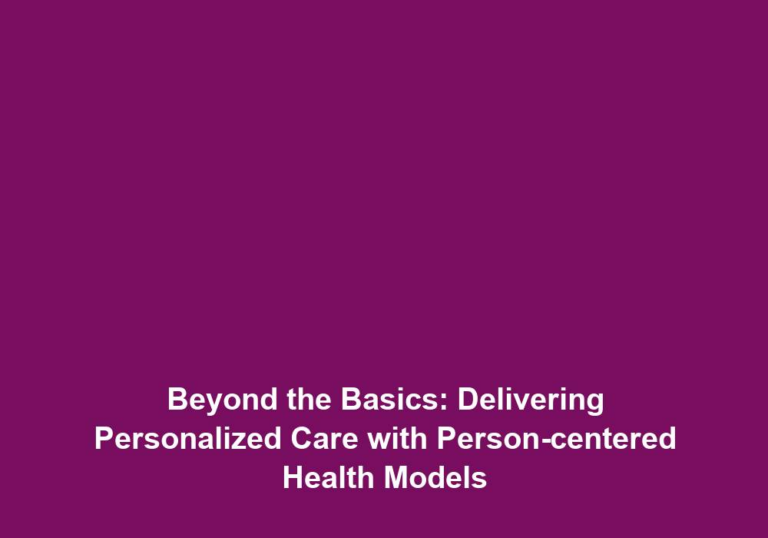Tailored Treatment: The Benefits of Person-centered Health Approaches
In today’s healthcare landscape, the concept of person-centered health approaches has gained significant recognition and importance. This innovative approach prioritizes individual needs, preferences, and goals, ensuring that healthcare services are tailored to meet the unique requirements of each patient. By focusing on the person as a whole, rather than just their symptoms or condition, person-centered health approaches offer numerous benefits that can greatly improve patient outcomes and overall satisfaction. In this article, we will explore the advantages of this approach and why it is crucial in modern healthcare.
Understanding Person-centered Health Approaches
Person-centered health approaches revolve around the principle that patients should be active participants in their own care. It emphasizes the importance of forming a collaborative partnership between healthcare professionals and patients, where decisions are made together based on shared understanding, trust, and respect. This approach recognizes that every individual has unique circumstances, values, and beliefs that should be taken into consideration when developing a treatment plan.
Person-centered health approaches aim to shift the focus from a one-size-fits-all approach to a more personalized and tailored approach. By actively involving patients in the decision-making process, healthcare providers can empower them to take ownership of their health and well-being. This collaborative approach not only enhances patient engagement but also encourages patients to become advocates for their own health.
The Benefits of Person-centered Health Approaches
- Enhanced Patient Engagement:
-
Person-centered health approaches promote active engagement and involvement of patients in their own care. By actively involving patients in decision-making processes, healthcare providers can empower them to take ownership of their health and well-being. This increased engagement often leads to higher levels of patient satisfaction and adherence to treatment plans.
-
Patients are more likely to be satisfied with their care when they feel actively involved in their healthcare decisions. By prioritizing open communication, shared decision-making, and collaborative relationships between healthcare providers and patients, person-centered health approaches foster trust, respect, and a sense of being valued. This enhances patient satisfaction and overall healthcare experience.
-
Active patient engagement can also lead to better adherence to treatment recommendations. When patients are involved in the decision-making process, they are more likely to understand and follow the recommended treatment plan, leading to improved health outcomes.
- Individualized Treatment Plans:
-
With person-centered health approaches, treatment plans are tailored to the specific needs, preferences, and goals of each patient. This individualized approach ensures that patients receive appropriate care based on their unique circumstances.
-
By addressing the person as a whole, rather than just their symptoms or condition, healthcare providers can better understand and meet the needs of their patients. This holistic approach takes into consideration not only the physical aspects of health but also the emotional, social, and psychological well-being of the individual.
-
Individualized treatment plans can lead to better treatment outcomes. By considering the individual’s preferences, values, and goals, healthcare providers can develop treatment plans that are more likely to be effective and sustainable. This tailored approach increases the likelihood of patient adherence and improves overall health outcomes.
- Improved Health Outcomes:
-
Person-centered health approaches have been shown to lead to improved health outcomes. By considering the individual’s preferences, values, and goals, healthcare providers can develop treatment plans that are more likely to be effective and sustainable.
-
When patients actively participate in their own care, they are more likely to adhere to treatment recommendations. This increased adherence can lead to better health outcomes and a reduced risk of complications.
-
By involving patients in the decision-making process, person-centered health approaches promote a sense of autonomy and empowerment. This can have a positive impact on patients’ mental well-being, which in turn can contribute to improved overall health outcomes.
- Increased Patient Satisfaction:
-
When patients feel actively involved in their healthcare decisions, they are more likely to be satisfied with their care. Person-centered health approaches prioritize open communication, shared decision-making, and collaborative relationships between healthcare providers and patients.
-
By fostering trust, respect, and a sense of being valued, person-centered health approaches enhance patient satisfaction and overall healthcare experience. Patients are more likely to trust their healthcare providers and feel that their needs and preferences are being taken into consideration.
-
Increased patient satisfaction can also lead to better patient-provider relationships. When patients are satisfied with their care, they are more likely to continue seeking care from the same healthcare provider, leading to continuity of care and improved patient outcomes.
- Improved Provider-Patient Relationship:
-
Person-centered health approaches emphasize building strong and collaborative relationships between healthcare providers and patients. By understanding the individual’s unique circumstances, healthcare providers can establish a strong rapport and trust.
-
This positive provider-patient relationship leads to better communication, shared decision-making, and improved patient outcomes. When patients feel heard, understood, and respected, they are more likely to actively participate in their own care and adhere to treatment recommendations.
-
A strong provider-patient relationship also contributes to greater patient satisfaction and overall healthcare experience. Patients are more likely to trust their healthcare providers and feel comfortable discussing their concerns and preferences.
Implementing Person-centered Health Approaches
To successfully implement person-centered health approaches, healthcare organizations and professionals can consider the following strategies:
- Active Listening:
-
Healthcare providers should actively listen to their patients, allowing them to express their concerns, needs, and preferences. Active listening involves paying attention to verbal and non-verbal cues, showing empathy, and creating a safe and non-judgmental environment.
-
By actively listening to patients, healthcare providers can gain a deeper understanding of their unique circumstances and tailor the treatment plan accordingly. This helps in building trust and rapport with patients, which is essential for effective person-centered care.
-
Active listening also promotes patient engagement and empowerment. When patients feel heard and understood, they are more likely to actively participate in their own care and take ownership of their health.
- Shared Decision-making:
-
Encouraging shared decision-making ensures that patients are actively involved in their healthcare decisions. Healthcare providers can present treatment options, discuss risks and benefits, and collaborate with patients to make informed choices.
-
Shared decision-making requires effective communication and mutual respect between healthcare providers and patients. It involves providing patients with the necessary information, including the potential risks and benefits of different treatment options, and helping them understand their options.
-
By involving patients in the decision-making process, healthcare providers can ensure that the treatment plan aligns with the patient’s values, preferences, and goals. This increases the likelihood of patient adherence and improves treatment outcomes.
- Cultural Sensitivity:
-
Cultural sensitivity is crucial in person-centered care as it acknowledges and respects diverse beliefs, values, and backgrounds. Healthcare providers should be aware of cultural differences and adapt their approach to ensure personalized and inclusive care.
-
Cultural sensitivity involves recognizing and valuing the cultural diversity of patients. It requires healthcare providers to be knowledgeable about different cultural practices, beliefs, and traditions that may impact healthcare decisions and preferences.
-
By being culturally sensitive, healthcare providers can create a welcoming and inclusive environment where patients feel respected and understood. This promotes patient engagement, trust, and satisfaction.
- Continuity of Care:
-
Continuity of care is essential in person-centered health approaches, ensuring that patients receive consistent and coordinated care. Healthcare providers should strive to establish ongoing relationships with patients, enabling a deeper understanding of their needs over time.
-
Continuity of care involves providing seamless transitions between different healthcare settings, such as hospitals, clinics, and home care. It requires effective communication and coordination among healthcare providers involved in the patient’s care.
-
By maintaining continuity of care, healthcare providers can better understand the patient’s unique circumstances, preferences, and goals. This enables them to provide personalized and tailored care that takes into consideration the patient’s previous experiences and ongoing healthcare needs.
Conclusion
Person-centered health approaches prioritize the individual’s needs, preferences, and goals, revolutionizing the way healthcare services are delivered. By actively involving patients in their own care, tailoring treatment plans, and promoting shared decision-making, these approaches lead to enhanced patient engagement, improved health outcomes, and increased satisfaction. Implementing person-centered care requires active listening, shared decision-making, cultural sensitivity, and continuity of care. By embracing these principles, healthcare providers can deliver more effective and compassionate care, ultimately leading to better patient outcomes and improved overall healthcare experiences.


